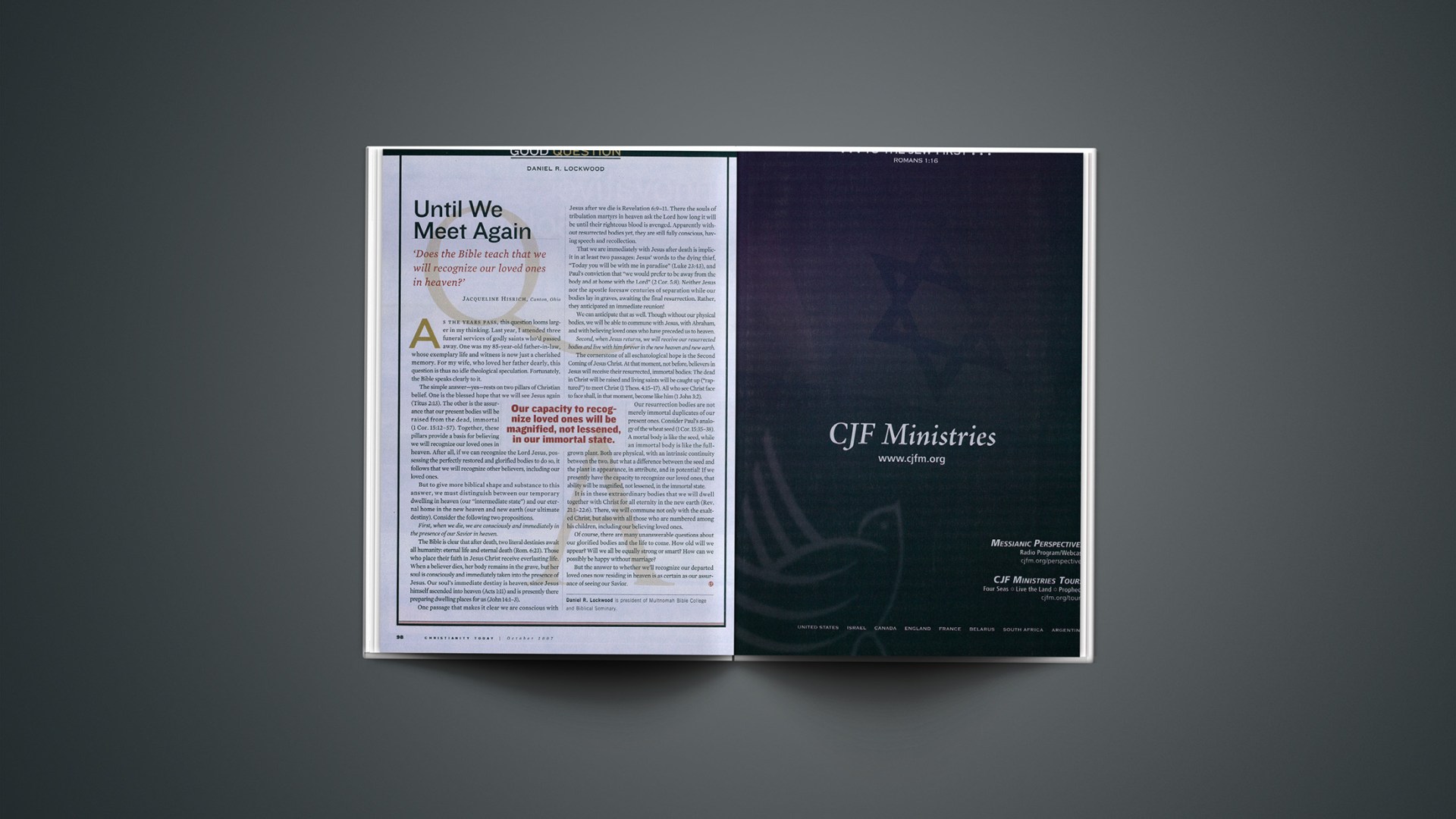As the years pass, this question looms larger in my thinking. Last year, I attended three funeral services of godly saints who'd passed away. One was my 85-year-old father-in-law, whose exemplary life and witness is now just a cherished memory. For my wife, who loved her father dearly, this question is thus no idle theological speculation. Fortunately, the Bible speaks clearly to it.
The simple answer—yes—rests on two pillars of Christian belief. One is the blessed hope that we will see Jesus again (Titus 2:13). The other is the assurance that our present bodies will be raised from the dead, immortal (1 Cor. 15:12-57). Together, these pillars provide a basis for believing we will recognize our loved ones in heaven. After all, if we can recognize the Lord Jesus, possessing the perfectly restored and glorified bodies to do so, it follows that we will recognize other believers, including our loved ones.
But to give more biblical shape and substance to this answer, we must distinguish between our temporary dwelling in heaven (our "intermediate state") and our eternal home in the new heaven and new earth (our ultimate destiny). Consider the following two propositions.
First, when we die, we are consciously and immediately in the presence of our Savior in heaven.
The Bible is clear that after death, two literal destinies await all humanity: eternal life and eternal death (Rom. 6:23). Those who place their faith in Jesus Christ receive everlasting life. When a believer dies, her body remains in the grave, but her soul is consciously and immediately taken into the presence of Jesus. Our soul's immediate destiny is heaven, since Jesus himself ascended into heaven (Acts 1:11) and is presently there preparing dwelling places for us (John 14:1-3).
One passage that makes it clear we are conscious with Jesus after we die is Revelation 6:9-11. There the souls of tribulation martyrs in heaven ask the Lord how long it will be until their righteous blood is avenged. Apparently without resurrected bodies yet, they are still fully conscious, having speech and recollection.
That we are immediately with Jesus after death is implicit in at least two passages: Jesus' words to the dying thief, "Today you will be with me in paradise" (Luke 23:43), and Paul's conviction that "we would prefer to be away from the body and at home with the Lord" (2 Cor. 5:8). Neither Jesus nor the apostle foresaw centuries of separation while our bodies lay in graves, awaiting the final resurrection. Rather, they anticipated an immediate reunion!
We can anticipate that as well. Though without our physical bodies, we will be able to commune with Jesus, with Abraham, and with believing loved ones who have preceded us to heaven.
Second, when Jesus returns, we will receive our resurrected bodies and live with him forever in the new heaven and new earth.
The cornerstone of all eschatological hope is the Second Coming of Jesus Christ. At that moment, not before, believers in Jesus will receive their resurrected, immortal bodies: The dead in Christ will be raised and living saints will be caught up ("raptured") to meet Christ (1 Thess. 4:15-17). All who see Christ face to face shall, in that moment, become like him (1 John 3:2).
Our resurrection bodies are not merely immortal duplicates of our present ones. Consider Paul's analogy of the wheat seed (1 Cor. 15:35-38). A mortal body is like the seed, while an immortal body is like the full-grown plant. Both are physical, with an intrinsic continuity between the two. But what a difference between the seed and the plant in appearance, in attribute, and in potential! If we presently have the capacity to recognize our loved ones, that ability will be magnified, not lessened, in the immortal state.
It is in these extraordinary bodies that we will dwell together with Christ for all eternity in the new earth (Rev. 21:1-22:6). There, we will commune not only with the exalted Christ, but also with all those who are numbered among his children, including our believing loved ones.
Of course, there are many unanswerable questions about our glorified bodies and the life to come. How old will we appear? Will we all be equally strong or smart? How can we possibly be happy without marriage?
But the answer to whether we'll recognize our departed loved ones now residing in heaven is as certain as our assurance of seeing our Savior.
Daniel R. Lockwood is president of Multnomah Bible College and Biblical Seminary.
Copyright © 2007 Christianity Today. Click for reprint information.
Related Elsewhere:
Daniel R. Lockwood has been president of Multnomah Bible College and Seminary since 1997.
Articles in a 2003 series on commonly asked questions about heaven include "Harleys in Heaven," "What Will Heaven Be Like?," "Afraid of Heaven," "Heaven Can't Wait," and more.
Previous Good Questions include:
Can We Expect God to Forgive Unbelievers Who 'Don't Know What They're Doing'?
Do a man and a woman become married after having sex or after exchanging vows?
How is it that not all prayers for the salvation of others are answered?
If God is in us, shouldn't it be easier to love one another?
Is there a biblical principle behind the punishment of those who break the law?










